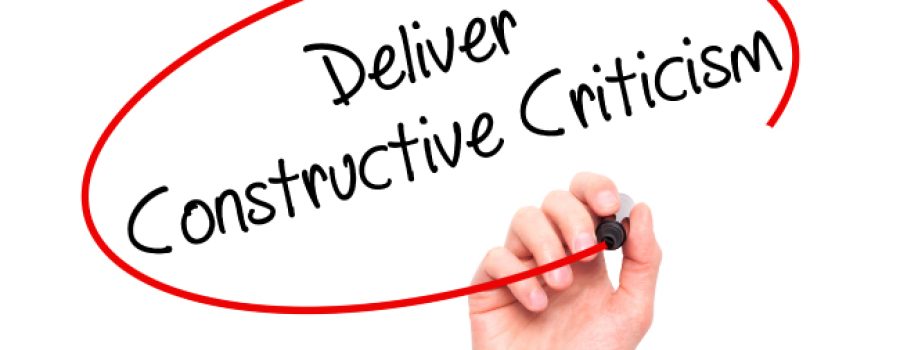Most of us can accept compliments. Some of us can accept suggestions. One or two of us can bend our minds around a completely new idea. But when it comes to criticism, that’s where most of us shut the door and hang up the “closed” sign. After all, who wants to hear the sentences that begin with, “You want to know what your problem is?” or “If only you would just change (fill in the blank) about yourself”? Few people learn how to accept (or give) criticism gracefully as they are growing up. Many may have been criticized harshly or told things for their “own good” that were hurtful rather than helpful. We learn to dread anything that seems judgmental or critical. Yet, if we can learn to truly listen to criticism about ourselves, we open the door to possibility. Learning to accept and use criticism can be one of the most constructive and profound tools to change ourselves and improve our relationships with others. Not only can we learn more about who we are and how others see us, but we may also learn that it’s okay not to be perfect. And, as a bonus, we may learn that people will love us anyway, warts and all.
Criticism as Opportunity
I’ve learned that criticism is an opportunity to become a better person. When you feel less than or imperfect our first instinct is to defend ourselves, right? Once you feel secure, maybe not perfect, because let’s face it whose perfect, but secure, you can listen to the criticism.
The next time you are criticized for being wrong, ask yourself if the criticism is true. Who knows your faults better than YOU! When you are genuinely
Byron Katie, author of Loving What Is, calls criticism “a powerful tool for self-realization and growth.” She suggests that when we are criticized for being wrong, unkind, uncaring, etc., we should ask ourselves if the criticism is true. If we can accept the truth without stress or pain, we free ourselves from trying to hide who we are from others. We know our faults and we accept them and, therefore, criticism from others cannot hurt us. When you are genuinely down-to-earth, is no place for criticism.
Learning from Our Children
Parents are often among the most criticized group of people. Their parenting choices are targeted by relatives, other parents, strangers and parenting “experts.” And when their children are old enough to speak, they join in the chorus! But of all the voices, it may be our children who offer us the most valuable criticism because they see us at our most vulnerable and unguarded. Children—especially teens—will tell us exactly what they think, sometimes painfully honest, language. If you are able as parents to drop your authority roles and your belief that you know better because you are older/wiser/better, you can learn some awe-inspiring truths about yourself. (And yes, it will hurt at times!) By doing this, we also model the art of accepting criticism—a valuable skill for your children as they grow up.
Questions to Ask Yourself
Don Powell, Ph.D, of the American Institute for Preventive Medicine writes that sometimes criticism—the right kind of criticism—is just what we need to make important changes. In an AIPM handbook, Dr. Powell outlines the following questions to ask yourself when working with criticism:
- Does the criticism seem reasonable? Is there some truth to what was said? (Perhaps you should pay attention to the remark.)
- Have I been criticized by other people on the same issue? (If so, maybe it warrants attention.)
- Does the person making the critical remark know what he or she is talking about? (If he or she is a self-appointed critic-at-large, ignore the remark.)
- Was the remark really directed at me, or was the critic venting general frustration, anger, or bitterness at something over which I have no control? (If criticism stems from general dissatisfaction, let it slide.)
- Is the criticism based on a difference of opinion? (If so, don’t overreact.)
Once you decide that there is some truth to the criticism, you are on the path to taking positive steps to make changes in your behavior or outlook. Being able to hear and absorb criticism without anger or defensiveness helps make the path that much smoother.
Written by Cathy Warschaw, CPC, ELI-MP
Founder & Make It Happen Coach
www.UpAllNightCoaching.com/dental
800.660.6707
© Up All Night Coaching, 2016
Do you have a coach? If not, you could be limiting your career success. That’s because coaches help you identify and focus on what’s important, which accelerates your success. They force you to think about your business in ways that you wouldn’t on your own. Now think about any stress you might have, a coach will show you how to take that stress and put it to good use. Athletes and top level Executives have relied on coaches for years to improve their game and careers. If multi-million-dollar executives and athletes rely on coaches to improve, why shouldn’t you? Up All Night Coaching is the answer for all of your coaching needs.





